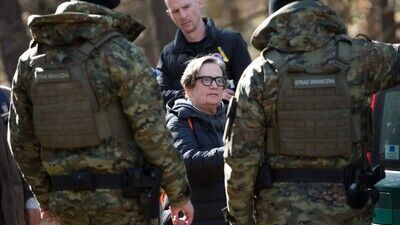Well, that forest is very beautiful. The people living there, and all of Poland, are very proud of that forest. It’s the oldest forest in Europe, and it has a lot of very natural spots that are untouched by mankind, as well as a lot of wild animals and everything. So tourists go there a lot to enjoy it, and nature lovers move to that area. Then suddenly, that forest changed into a kind of horror place. When you go out to pick mushrooms, you might step over the dead body of some young man.
It is still quite warm in the fall, but the nights are very cold. One young refugee died in the forest because of hypothermia. He froze to death. My activist friend found him on a bed of flowers, lying totally naked because he had taken his clothes off. When you are dying of hypothermia, actually, you feel this incredible heat. So he removed his clothes and lay naked on a bed of flowers. It was like an image of, I don’t know, Jesus Christ or something. It stayed with my friend, who could not work and speak for a long time afterward. It was so tragic.
This film is bleak, but there are wonderful pockets of empathy and hope. What do you want audiences to take away from the film once they’ve watched it?
I hope they will at least embrace the feeling that we are all humans, which is the most important thing. If we change our values about human rights, freedom, democracy, respect for others, and equality to hold on to our comfort, we will lose our comfort and our values by the end of the day. We will remain just with our fear and our pain.
Are there any women filmmakers or films directed by women that you particularly think audiences should seek out?
There are many talented women directors, especially in France. Some of them have won important festivals like Cannes and Venice. Justine Triet’s “Anatomy of a Fall” was nominated for many Oscars and Golden Globes.
I also have two heroes from the past. One is Agnès Varda, who died a few years ago. She was the most courageous, talented, creative, and original woman director, so it’s worth it to go through her filmography. The other is Czech filmmaker Věra Chytilová, especially one of her films from the 1960s, “Daisies,” which is the most anarchistic, feminist, and artistic statement. It is inspiring, I think, for young filmmakers.
